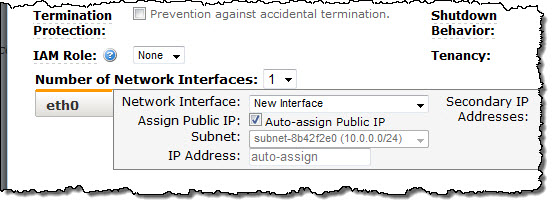AWS News Blog
Additional IP Address Flexibility in the Virtual Private Cloud
VPC So Far
The Amazon Virtual Private Cloud (VPC) lets you provision a logically isolated section of the AWS Cloud where you can launch AWS resources in a virtual network that you define. Earlier this year, in my post Virtual Private Clouds for Everyone, I outlined some important changes to Amazon EC2 which combine its ease of use with the advanced networking features of Amazon VPC.
As part of that launch, we introduced the concept of the default subnet for default VPCs. EC2 instances created in the default subnet automatically received public IP addresses; instances in the other subnets did not. This was a very sensible default behavior because it made the new VPC feature more or less transparent.
More Control
Today we are launching a new feature that gives you additional control of public IP addresses in VPC at launch time. Here’s the scoop:
- When you launch an instance into a default subnet, you now have the ability to decide if the instance is given a public IP address. Until now, launches into a default subnet were always assigned a public IP address and there was no way to remove it.
- When you launch an instance into a nondefault subnet, you can now choose to assign a public IP address as part of the launch. In the past you had to launch the instance and then allocate and attach an Elastic IP address after the instance became available.
The AWS Management Console includes complete support for this new feature. If you are launching into a default VPC and you don’t select a subnet, or if you are making a Spot Instance request, you can check or uncheck a single check box in the launch wizard to select the desired outcome:

If you choose a specific subnet for your launch, you will see a similar checkbox in the ENI (Elastic Network Interface) section of the launch wizard:

The initial setting of the checkbox (checked or unchecked) reflects the behavior introduced when we launched VPCs for everyone. In other words, if you want the existing behavior, leave the checkbox the way you found it.
Some Notes
I should note that this feature is available only at launch time. If you do not assign a public IP address to an instance during the launch, you can associate an Elastic IP address after the instance has been launched.
Also, if, for some reason, you decide to attach an Elastic IP address to an instance that already has a public IP address, the Elastic IP address will replace the public IP address. When you detach the Elastic IP address from the instance, a new public IP address will be assigned to the instance.
We expect to add CloudFormation and Auto Scaling support before too long.
To learn more about this new feature, read the Using Instance Addressing topic in the EC2 documentation.
— Jeff;